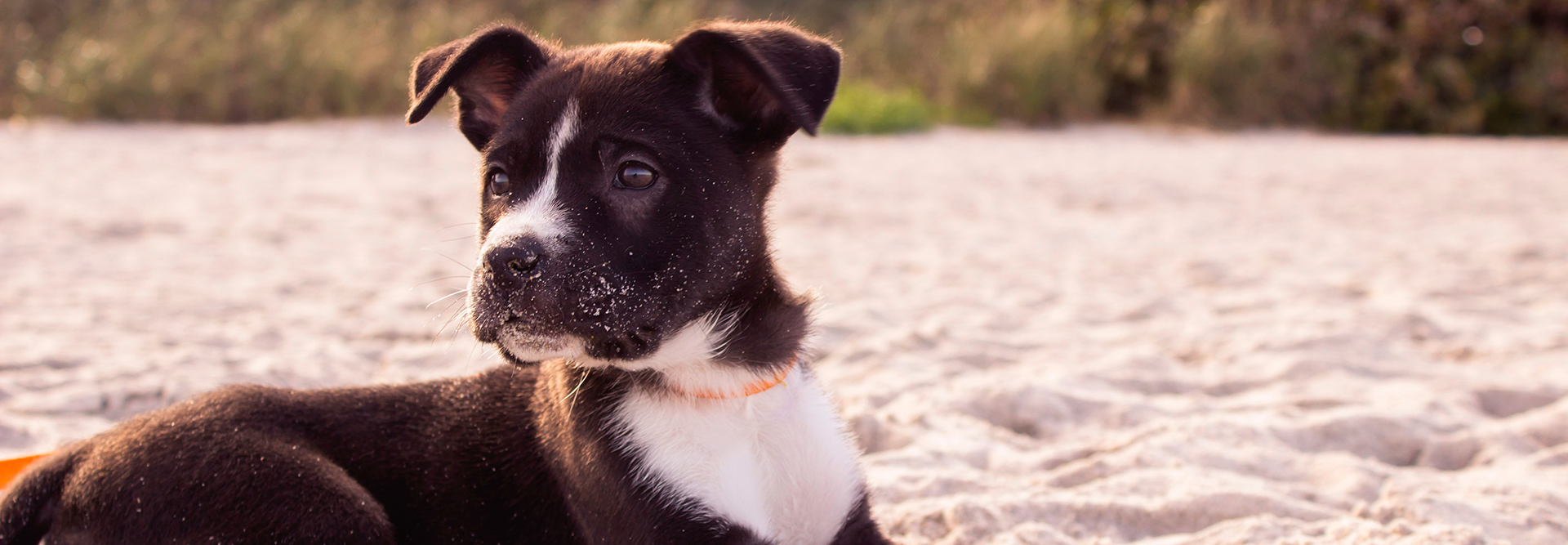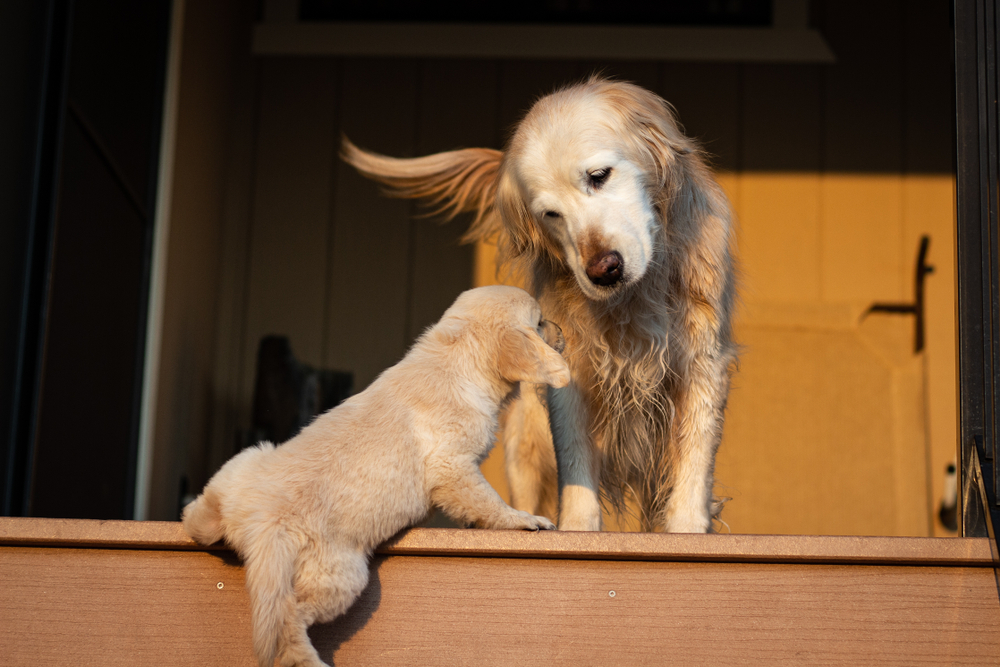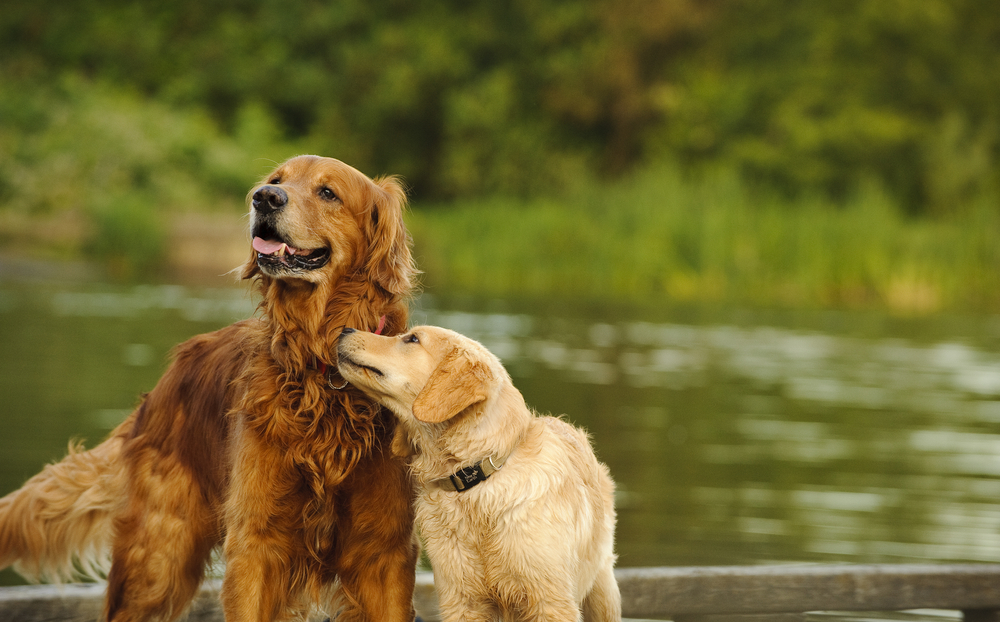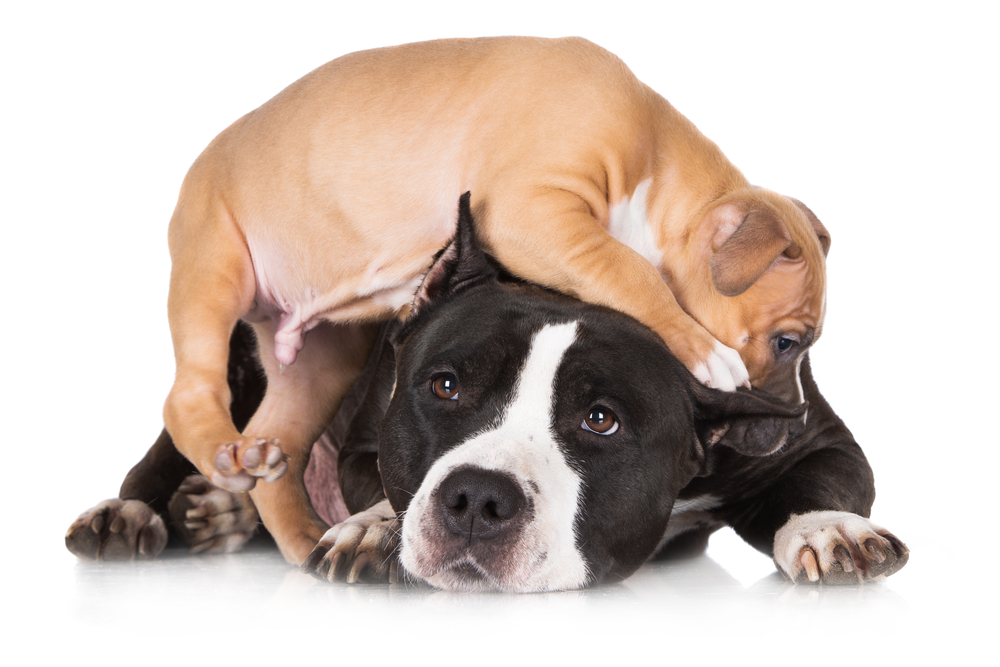Phone: +1 (903) 561-3142

As your loyal dog gets up there in years, coming into his twilight years, you might notice he has less energy, moves at a slower pace, and seems to be spending a little more time alone. While this is a natural part of a dog’s aging process during life, it could cause him to miss […]
As your loyal dog gets up there in years, coming into his twilight years, you might notice he has less energy, moves at a slower pace, and seems to be spending a little more time alone. While this is a natural part of a dog’s aging process during life, it could cause him to miss out on socializing and receiving the degree of affection that all dogs need.
Did you know that adding a new puppy to your household can greatly benefit the emotional wellbeing of your older dog?
Puppies bring fresh energy, playfulness, and curiosity to their homes. When an older dog has become slower and less frequently seeks out attention and affection, the dog’s overall health begins to decline as a result. But if a puppy is introduced, oftentimes the puppy energizes the older dog, stimulating him intellectually and also with exercise.
Dogs are social creatures, and though it might not be obvious to the human eye, when an older dog is socializing with a puppy, the older dog is in essence teaching and training the puppy how to behave socially. Both the older dog and the puppy greatly benefit from this household interaction. And best of all, this is only the beginning of the benefits a new puppy brings to older dogs.
In this article, we’ll take a look at all the benefits to help you decide whether or not getting a new puppy for your older dog is a good idea for your household.

We touched upon this concept at the beginning of this blog post. Social interaction with a puppy can increase your senior dog’s happiness. One of the biggest areas of increased happiness comes in the form of daily exercise.
As dogs age, reaching the last few years of life, they tend to slow down. What can happen is that the dog’s owner sees that the dog desires less playtime and exercise, and so they provide less playtime and exercise. It’s interesting how dogs kind of train their owners in this way. Dogs spend their whole lives nudging and driving their owners to get outside, play, and exercise. So when a dog stops demanding this, the owner can easily think that if the dog doesn’t want to move around, then why take him for that long walk or to the dog park?
But actually, by “going along with” the older dog’s natural decline, the owner is unfortunately contributing to the dog’s decline in happiness.
Pet parents of older dogs are often surprised at how their slow, older dog “perks up” and gets “energized” as soon as a new puppy comes home. The older dog is more than happy to get outside with the puppy, and while the older dog may not be able to “keep up,” he will experience joy and happiness at interacting playfully with a puppy that’s running circles around him!
This refreshed spirit of playfulness in your older dog won’t tire him out or cause him to age faster. Some dog owners worry about this and the fear prevents them from getting a new puppy. But this isn’t the case, and you shouldn’t let it stop you. Your senior dog will definitely become more playful with a new puppy around. Now, will this mean that your older dog will suddenly regain all the energy he once had as a puppy? Probably not, but his countenance, mood, and spirit will be energized.
Older dogs who had “lost interest” in games like fetch often regain their competitive nature when a new puppy starts playing fetch with the pet parents. Puppies are known for their affectionate, playful nature, and because older dogs have developed patience, the pair can be a match made in heaven. You might even notice that your older dog is quite the babysitter! He may occupy your puppy’s attention, keeping him engaged, especially when you’re away from home.

This is perhaps the greatest health benefit that your older dog will experience when you bring a new puppy home. Since puppies require several trips outside to go to the bathroom, multiple walks around the block per day, plus longer outings to run around and expel a lot of energy, your older dog will have the opportunity to get up, get out, and move around, too.
Even around the house, when your puppy is bounding from one room to the next, your older dog may be interested to try and keep up. Or maybe your older dog will tag along just to make sure that the new puppy doesn’t mess with his toys or food bowl. Either way, when your older dog is around a puppy, he will naturally get more daily exercise. This will help him to reduce stress and elevate the happy chemicals in his brain.
Though no one can predict how much longer your older dog will live due to introducing a puppy into the home, there is a fair amount of ongoing science that supports the theory. When an older dog is left to age naturally, he will get less exercise and experience a decreased mood that could become depressed. This is all part of the “slowing down” process that comes with aging, which we’ve discussed in this article already.
However, when an older dog simply gets more daily exercise, the movement itself gets the blood pumping, more oxygen goes in, and his joints and bones gain strength, all of which can greatly slow down the aging process. Plus, by expending more energy, the dog will eat a bit more, which will deliver more nutrients to his body, which in turn also can slow down the aging process. Thanks to the fact that a puppy will automatically cause an older dog to move around more and get more exercise, it stands to reason that the puppy can help to extend the older dog’s lifespan.
And that only addresses the physical aspects of aging. There are emotional and mental aspects, as well. The social interaction that your older dog will experience thanks to the puppy will boost both of the dogs emotional wellbeing and intellectual stimulation needs. This is due to the fact that both dogs are “learning” about the other dogs’ likes and dislikes, and how to behave in order to get along. The nature of being “pack animals” means that there is always an unspoken conversation going on between the dogs.

We touched on it very briefly earlier, but it can’t be overstated enough that your puppy will benefit, too, in that he will never have to be alone. One of the hardest things that puppies have to adjust to once they enter a new home is the fact that they can’t be with their new pet parents all the time. They must spend some time alone. While it’s healthy for a puppy to learn how to self-soothe and enjoy his alone time, it can be emotionally traumatizing for some puppies. But when there’s an older dog at home, your puppy will never have to be alone.
This friend and “babysitter” benefit will help your puppy to gradually spend time alone. He can seek out the older dog when he needs direct comfort. And when he’s feeling independent, he can entertain himself or rest in another part of the house, knowing all the while that if he gets lonely or scared, all he’ll have to do is find his big brother. This type of “safety net” can help build the puppy’s confidence and healthy independence while you’re away from home.
As we wrap up this article, we’ll address one final thing to fully consider before you buy a new puppy to bring home to your older dog. Some older dogs, based on their breed, their personality, or both, will not be inclined to accept a puppy in the household. No one knows your older dog better than you. So, if you’ve seen character traits or signs in your older dog that tells your gut that he won’t get along with a puppy, then we advise that you listen to your gut. The last thing you want is to ignore your instincts, bring a puppy home, and have an incident occur.
If you’re unsure of whether or not your older dog will accept a puppy, you could try introducing him to younger dogs and puppies at the dog park, and observe his mood and behavior. If you have any friends who recently got a puppy, you could invite them over to your house to see how your older dog reacts to a puppy within the home. During these encounters, watch your older dog to see if he’s exhibiting patience, gentleness, curiosity, and playfulness. All of these responses are green lights that your older dog will benefit from a puppy.